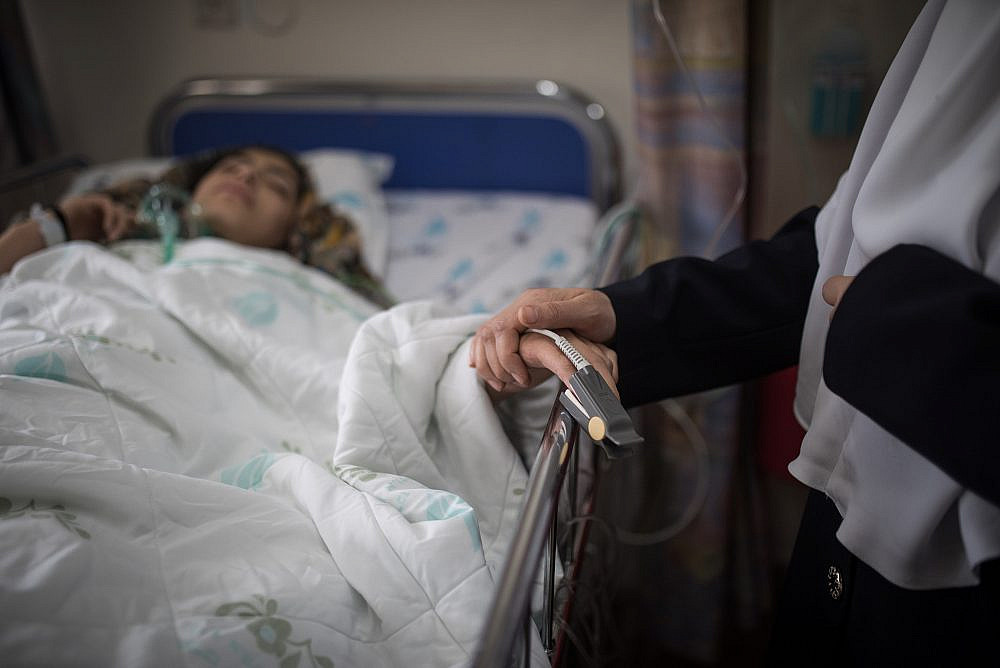Fewer children from Gaza were separated from their parents when receiving treatment outside the strip in 2019 than in the previous year, according to statistics by the Coordinator of Government Activities in the Territories (COGAT), the Israeli military body responsible for administering the occupation and blockade. This appears to be an improvement, but what the data fails to show is the anxiety and trauma inflicted on these children and their families as a result of Israel’s restrictions on movement.
Between October 2018 and July 2019, 21 percent of children who were treated outside the strip were not accompanied by their parents, compared to 56 percent between February and September 2018. Even with this positive development — that’s one in five children from Gaza who had to receive treatment without their mother or father at their side.
The data, which was provided to Physicians for Human Rights Israel (PHRI), also shows that in 2019, 4,165 permits were issued for accompanying parents and 5,289 for minors. Between February and September 2018, only 1,859 permits were issued for accompanying parents as against 4,581 permits for minors.
The improved figures may have brought relief to many families in Gaza, but it remains important to discuss what the numbers are hiding.
Parents who were denied permits to accompany their children were forced to send their kids to hospitals escorted by relatives or strangers. These other individuals tended to be the elderly, whose permit requests take a relatively short time to process by the army or who do not need to undergo security checks. In other cases, because of the rejection of the parents’ requests, children were deprived of vital — and sometimes even urgent — medical treatment.
The Israeli army’s medical permit policy for Gaza does not take into account the mental and physical consequences it incurs on children in need of medical care or on their parents. This situation is evident in PHRI’s handling of requests for help by Palestinian parents whose attempts to accompany their children out of Gaza have been rejected.
Israel views its granting of medical exit permits as a humanitarian gesture, since it does not see itself in any way obligated toward the Gaza Strip’s inhabitants. Consequently, many Palestinian parents are expected not to insist on their children’s right to health, but to submissively and gratefully accept whatever Israel is willing to concede to them.
PHRI has repeatedly demanded that the military authorities give greater weight to ensuring hospitalized children have their parents by their side, and to avoid potentially jeopardizing the children’s chances of recovery by denying their parents the right to accompany them. Israel has justified its rejection of these permits by arguing that approval was granted to another relative instead, and that the child still made it to the treatment facility.
It is predictable, though no less frustrating, that the security apparatus plays down Palestinians’ health concerns. However, it is even more disappointing to see the Israeli medical community acquiescing to this situation. The community has by and large surrendered to a reality in which children are cut off from their parents while receiving medical treatment — a state of affairs which can lead to anxiety and severe pain.
The medical community subscribes to the prevalent view in Israel regarding the importance of parental presence when their children are given medical care. This expectation is clearly stated in the Health Ministry’s directives, which makes a minor showing up alone for a medical appointment highly irregular. Why, then, do medical professionals not cite these directives and push for the free passage of parents from Gaza?
In deeming the presence of another family member as sufficient, both the Israeli army and the medical community are normalizing far lower standards of treatment for Palestinian children from Gaza than for Israeli children. This discrepancy stems from, and is enabled by, the longstanding dehumanization of Palestinians in Gaza.
The journey that families from Gaza must go through until their children leave for treatment — whether accompanied by the parents or by more distant relatives — is long, arduous, and fraught with a feeling of no control, fear for their children’s fate, and a deep sense of injustice. Every parent who requests an accompanier permit waits restlessly for the army’s reply. The threat of being refused a permit and, as a result, of the child potentially missing their appointment is an ever-present worry. In addition, if their application is unanswered or refused, parents will have to look for another escort, or risk having to restart the bureaucratic process all over again.
Many parents who turned to PHRI over the past year had waited for months before receiving a permit for a relative. Once the child had gone for their treatment with that relative, the parents reapplied in order to replace the escort, hoping that the answer would arrive in time and allow them to join their child. More often than not, these applications are never answered or are turned down again.
Dozens of parents and children from the Gaza Strip go through this ordeal every month. These children face illness and pain in unfamiliar surroundings, with their parents sitting hours away, worried and helpless. No parent wants to send their child far from home to fight an illness alone, not even accompanied by another relative. We must not normalize this bleak reality just because they are Palestinian families from Gaza.

